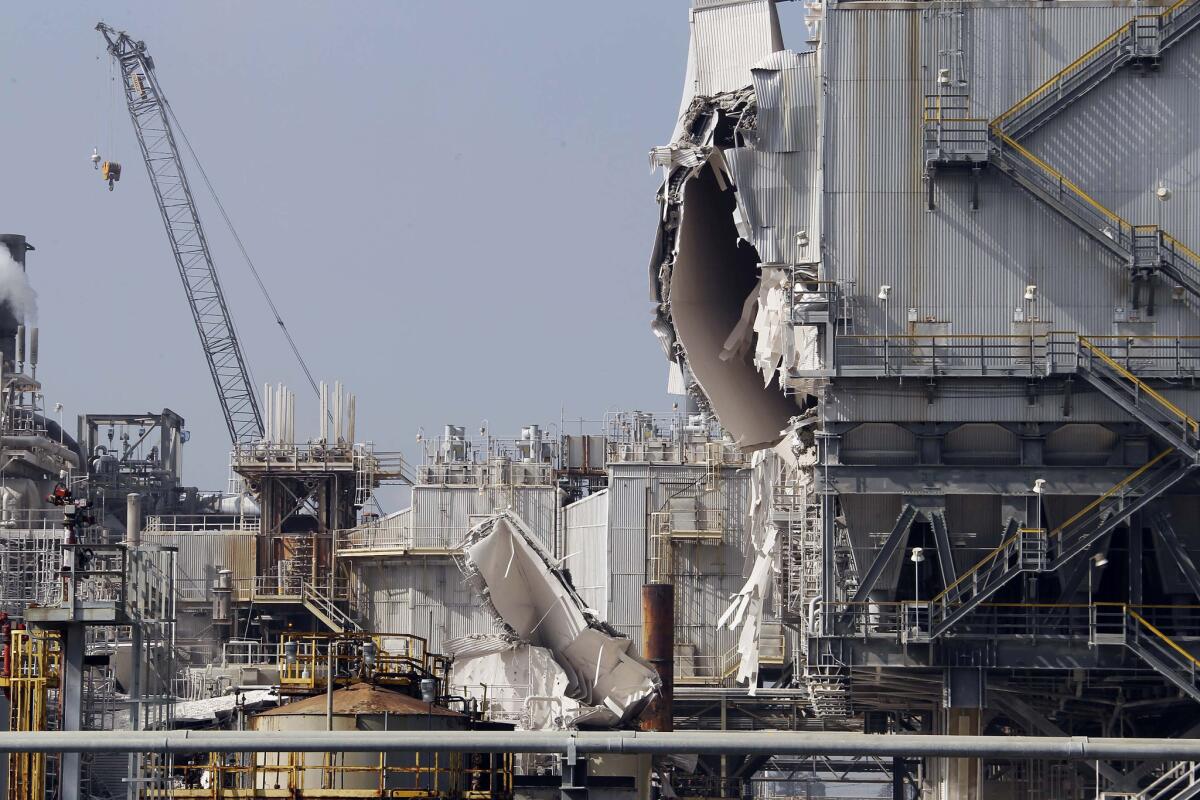Exxon Mobil fined $566,600 for Torrance refinery explosion

The Exxon Mobil refinery in Torrance after an explosion Feb. 18.
- Share via
Exxon Mobil was fined $566,600 in penalties Thursday after a large blast at the company’s Torrance refinery in February injured four workers.
The California Division of Occupational Safety and Health, or Cal/OSHA, issued 19 citations, most of which were classified as serious, for workplace safety and health violations.
Cal/OSHA found the company neglected to eliminate known hazardous conditions and “intentionally failed to comply with state safety standards,” likely resulting in workers being seriously injured or killed, according to the agency’s Department of Industrial Relations.
The company has 15 days to appeal the citations to the Occupational Safety and Health Appeals Board.
“Petroleum refineries have the responsibility to keep workers safe, and to also protect nearby communities and the environment,” department director Christine Baker said in a statement. “This investigation revealed severe lapses in Exxon’s safety protocols.”
Exxon Mobil is examining the citations stemming from the Feb. 18 explosion.
“We are reviewing the citations to determine the appropriate administrative and legal next steps,” Exxon Mobil spokesman Todd Spitler said. “We have, and will continue to work cooperatively with Cal/OSHA.”
Investigators concluded the blast was the result of a hydrocarbon release from the fluid catalytic cracker unit into the electrostatic precipitator -- a filtration device that removes fine particulates.
The hydrocarbon release caused the electrostatic precipitator to explode.
Eight workers were decontaminated, and four suffered minor injuries and were sent to hospitals.
After the blast, Cal/OSHA ordered Exxon Mobil to shut down the unit until it could demonstrate safe operation. The order remains in effect.
Cal/OSHA determined the company’s management knew the electrostatic precipitator could explode during a flammable vapor leakage. A safety review in 2007 addressed concerns about the leakage, but the company failed to fix it, according to Cal/OSHA.
Cal/OSHA found that the fluid catalytic cracker unit was not working properly for nine years. Exxon Mobil was unable to monitor hydrocarbon pressure buildup in the unit because there was no functional pressure transmitter, according to Cal/OSHA.
That misstep led to the explosion, said Clyde Trombettas, statewide manager and policy advisor for Cal/OSHA’s Process Safety Management Unit.
Cal/OSHA said Exxon Mobil’s incident response team knew that unit’s slide valve was leaking before the explosion.
Also, Cal/OSHA found that there were no written procedures on how to operate the unit when it was in a state of hot standby, which is similar to working on an idling car.
Exxon Mobil has repaired the errors.
“Exxon Mobil is surprisingly one of the most proactive refineries,” Trombettas said.
But the Torrance refinery must still complete its start-up procedures to lift the shut down order for fluid catalytic cracking unit.
The start-up procedures must address any mechanical actions, address any concerns and include training for workers operating the unit.
Cal/OSHA has investigated the refinery twice in the last five years for serious accidents resulting in injuries.
Only one involved the fluid catalytic cracker unit. In that one, a worker suffered a broken jaw and lost six teeth while working on the fluid catalytic cracker unit on March 29, 2011. The worker was attempting to shut down a failed pump, but the pump’s motor failed and exploded.
The other accident occurred in September 2011.
Exxon Mobil was issued eight citations, three of which were serious, in those cases.
The seriousness of the blast is comparable to the Aug. 6, 2012 Chevron refinery fire in Richmond, Trombettas said. In that incident, a severely corroded pipe in Chevron’s No. 4 Crude Unit began leaking and a massive fire broke out.
Cal/OSHA issued 25 citations against Chevron, resulting in nearly $1 million in penalites. Cal/OSHA found that Chevron didn’t follow recommendations to replace the corroded pipe.
The explosions have led to proposed changes in the regulation of petroleum refineries. The proposals include employee participation reviews of damaged mechanisms and safeguard protection and hazard control analysis, according to Cal/OSHA.
For breaking news in California, follow @VeronicaRochaLA.
More to Read
Sign up for Essential California
The most important California stories and recommendations in your inbox every morning.
You may occasionally receive promotional content from the Los Angeles Times.













